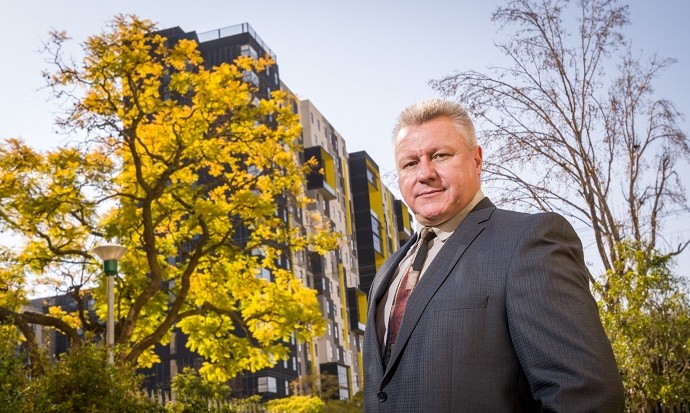
Prof Christiaan Bezuidenhout completed his undergraduate studies at the University of Pretoria (UP) and has been teaching full-time at the institution for the past 30 years. He says that as one of the best-known universities in Africa, UP has collaboration agreements with many global tertiary institutions, and that its contributions to the betterment of humanity makes it a global research institution. “Research is important, and as a lecturer who also does research, I can confirm that research feeds teaching and vice versa,” he says.
Prof Bezuidenhout says he is a researcher, teacher, scholar and advocate of the criminology discipline. “Criminology is the only science that encompasses itself with the crime phenomenon in its relativity.”
He is involved in three fields of research specialisation: criminal justice (policing), psychocriminology and juvenile. In terms of his work in the criminal justice field, he is a Fulbright scholar who is investigating the role and performance of female law enforcement (LE) officers in a traditional male working domain, in the Department of Criminal Justice at East Carolina University in the US. He was elected as a principal candidate for the Fulbright South African Research Scholar Programme for the 2021–2022 academic year and the research tenure is from August 2021 to April 2022.
Women still make up a noticeable minority in most LE departments around the world, Prof Bezuidenhout explains. Strategies to address this include targeted recruitment, proactive affirmative action measures, change in broader government policies and the discretionary interpretation of progressive LE leaders. Within the male-dominated world of LE, female officers from all race groups, as well as those from the LGBTQIA+ community, face many barriers and obstacles, such as disregard, discrimination, under-representation and stigma.
Although many gender mainstreaming initiatives have been implemented, women in policing are still under-represented, he adds. Attrition, rank and specialisation still seem to be gendered. Among younger recruits, there remains many who believe that males and females are suited to different tasks in LE. “Gender washing” initiatives are often used as window dressing and come in different forms: selective disclosure, dubious labelling and empty gender policies.
Prof Bezuidenhout’s research is in line with the United Nations’ Sustainable Development Goals (No 16) to promote peaceful and inclusive societies for sustainable development, provide access to justice for all, and build effective, accountable and inclusive institutions at all levels. It is also in line with UP’s faculty and departmental key research areas.
He regards this research project as a highlight, and intends to write about his findings in peer-reviewed journals and international peer-reviewed books, and present them at conferences.
In the psychocriminology field, Prof Bezuidenhout combines two disciplines – criminology and abnormal psychology – to explain atypical behaviours that occur in the South African context. In this field of expertise, he researches and writes about macabre criminal events in society: why people commit serial rapes or serial murders; what motivates children to murder their parents; and the link between personality as well as mental disorders and crime.
In the juvenile delinquency field, he has authored textbooks and launched community engagement projects. Many youth misbehaviour incidents occur because of immediate societal factors in a young person’s life, he asserts. These challenges and processes are addressed in the book Child and Youth Misbehaviour in South Africa: A Holistic Approach (2018), which Prof Bezuidenhout edited. The publication offers a look at all the factors (environmental, social, psychological and physiological) that influence youths to commit serious offences. The criminal justice system’s interaction with young offenders is also examined.
Along with an American colleague, Prof Bezuidenhout is also working on a cross-cultural study entitled ‘A comparative analysis of human trafficking between the USA and South Africa’, which focuses on legal and policing dilemmas. This was a quantitative study, and the first section has been completed. Prof Bezuidenhout was the principal researcher in South Africa.
At UP, he is involved in an envisaged research project with Dr Melanie Moen of the Department of Early Childhood Education that focuses on violence against children. Prof Bezuidenhout is the co-applicant and researcher for a grant from the Sexual Violence Research Initiative in the Knowledge for Action to End Violence Against Women and Violence Against Children Research Grant Programme. If the application is successful, a multidisciplinary team will undertake research entitled ‘Compassionate care to alleviate violence in children’ from April 2022.
South Africa is regarded as a “risk society” and one of the most violent countries in the world. Children exposed to violence and adversity are at high risk of developing psychiatric disorders. Yet there is a dearth in South African research and literature that relates to the differential risks children face, as well as in the documented perspectives, experiences and responses of children within diverse structural contexts.
If approved, the project will be a collaboration between researchers, the corporate sector, an NGO and schools in South Africa, and the Zero Abuse Project in the US. It will be an interdisciplinary study that takes place over two years, involving investigators in psychology, criminology, education and the social sciences.
Prof Aubrey Theron, former head of the Department of Criminology, inspired Prof Bezuidenhout’s research career. “As a young man, I wanted to become a game ranger or something practical, but Prof Theron said he believed that I had the potential to be an academic. He always had an open door for students and assisted with academic challenges. Eventually I got enmeshed in teaching and research, and the rest is history.” Prof Theron inspired him to use the stumbling blocks in his life as stepping stones, he adds. “His patience in difficult situations rubbed off on me and stood me in good stead in academically tough times and in my personal life.”
His mother was another source of inspiration for Prof Bezuidenhout. He describes her as “a hard-working, humble human being” and believes that those qualities have characterised his research career.
Prof Bezuidenhout hopes that his research will make a difference and address societal issues that are regarded as troublesome or problematic. He aims to contribute to the body of criminology knowledge by sharing his findings to improve our understanding of the world.
His research matters because his work looks at the underdog, or the minority, or the individual or group in strife, he says. “With good quality ethical research, one can address these issues and with informed opinions, one can make a difference,” he adds. “If you do not know something about anything – do research to know everything about something! To learners and students who would like to know why people commit crime, how society reacts to it, how crime is investigated, what the impact of crime is on the victim and society, as well as what is done to attempt rehabilitation of criminals, criminology is the discipline for you.”
Prof Bezuidenhout loves going to the Bushveld in winter, and enjoys its early morning sounds and smells with a cup of coffee in hand. He listens to music that feeds his soul and likes playing golf, but rarely gets the opportunity to play. “I am a petrol head at heart, but I cannot enjoy this passion wholeheartedly due to my number one commitment – my family.”
 Story
Story
Ms Melanie Moen, a lecturer in the Department of Early Childhood Education and PhD student in the Faculty of Education at the University of Pretoria (UP), presented a part of her doctorate research, namely an in-depth analysis of children who commit family member murder, at an international conference on psychology and law held in Nuremberg, Germany.
Copyright © University of Pretoria 2025. All rights reserved.
Get Social With Us
Download the UP Mobile App